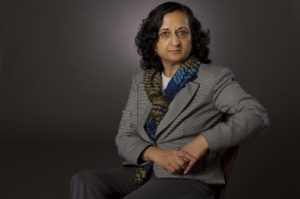
 Sponsored by the IEEE Control Systems Society.
Sponsored by the IEEE Control Systems Society.
Speaker: Anuradha Annaswamy, Senior Research Scientist and Director of the Active-Adaptive Control Laboratory at Massachusetts Institute of Technology
Title: Practical Adaptive Control
Abstract: Adaptive Control is viewed as a game changer in many application domains where real-time feedback control is essential to ensure the desired performance. Adaptive controllers, whose distinguishing feature is a parameter estimator that prescribes the rule for changing the control parameters in real-time, have been studied extensively over the past forty years, with fundamental properties of stability and robustness well understood. Guidelines for analysis and synthesis for adaptive controllers have been laid out for linear and (specific classes of) nonlinear systems, continuous and discrete-time systems, single-input and multi-input systems, and deterministic and stochastic systems. So what’s missing? There are glaring gaps in adaptive control theory that remain to be closed for adaptive control to be a viable, practical, and easily implementable methodology. Guarantees have to be provided that ensure robustness to a wide variety of non-parametric perturbations. Guidelines have to be in place for a systematic design of all free parameters in the controller. Bounds have to be derived, not only for steady-state behavior, but also for transient characteristics. Implementation issues will have to be satisfactorily addressed. The ability to accommodate actuator constraints in terms of bandwidth, magnitude limits, and rate limits has to be precisely characterized. Recently, there have been breakthroughs in Adaptive Control that have led to reducing the above gaps. This talk will outline the basic principles of the now classical adaptive control theory, but also highlight these recent results and show how they contribute towards making adaptive control practical.
Bio: Anuradha Annaswamy received her Ph.D. in Electrical Engineering from Yale University in 1985. She has been a member of the faculty at Yale, Boston University, and MIT where currently she is the director of the Active-Adaptive Control Laboratory and a Senior Research Scientist in the Department of Mechanical Engineering. Her research interests pertain to adaptive control theory and applications to aerospace, automotive, and propulsion systems, cyber physical systems science, and CPS applications to Smart Grids, Smart Cities, and Smart Infrastructures. She is the author of a hundred journal publications and numerous conference publications, co-author of a graduate textbook on adaptive control (2004), co-editor of several reports including “Systems & Control for the future of humanity, research agenda: Current and future roles, impact and grand challenges,” (Elsevier) “IEEE Vision for Smart Grid Control: 2030 and Beyond,” (IEEE Xplore) and Impact of Control Technology, (ieeecss.org/main/IoCT-report, ieeecss.org/general/IoCT2-report). Dr. Annaswamy has received several awards including the George Axelby and Control Systems Magazine best paper awards from the IEEE Control Systems Society (CSS), the Presidential Young Investigator award from NSF, the Hans Fisher Senior Fellowship from the Institute for Advanced Study at the Technische Universität München, the Donald Groen Julius Prize from the Institute of Mechanical Engineers, a Distinguished Member Award, and a Distinguished Lecturer Award from IEEE CSS. Dr. Annaswamy is a Fellow of the IEEE and IFAC. She has served as the Vice President for Conference Activities (2014-15), and is currently serving as the VP for Technical Activities (2017-18) in the Executive Committee of the IEEE CSS.